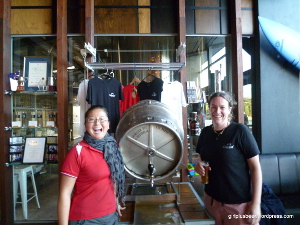
Colonial's German time travelling
Margaret River’sColonial Brewing Company recently launched its latest limited edition beer, the dampfbier. The release marks the fifth and final beer in the “lost beers of Germany” series which started in late 2011 with the mumme beer.

Sorcha Gillen (right) with Pia Poynton at the launch
The series was inspired by head brewer Mal Secourable’s trip to Germany, visiting Cologne and Dusseldorf where Kölsch and Altbier were born. The subsequent series of beers emphasised old world brewing and the origins of more modern day beer styles. Though Mal has moved on, his assistant brewer Sorcha Gillen has showed the same energy and passion for the series in her creation and brewing of Colonial’s Dampfbier
Colonial’s limited editions have taken drinkers on a journey through the Bavarian Forest, the Iron Curtain and the Berlin Wall. For brewery manager Richard Moroney it was essential the beers were great on the palate as well as being interesting.
Already rich with history, as beer styles tend to be, they wanted beers with layers of flavour perhaps hinting at something you may have tried once before. Richard describes the series as “a sharing of ancestry and philosophy of not only the beer but the lineage and evolution of these beers into their modern day interpretations. Each of our releases shared a snapshot of time and place.”
It’s a journey Sorcha has enjoyed immensely, delving into the history and origins of forgotten styles.
“The most fascinating part is the research”, she says.
“it’s such a different world and different era and in a nerdy kind of way each time I try one of the beers we have re-created I always think back to its origins and try and try to imagine myself being entrenched within them!”
The journey began with the Colonial Mumme (5.5% abv), a style from the northern German lowlands in Braunschweig. Pronounced moo-muh (not mummy) the beer style is considered as the ancestor to kolsch and altbier; quite fitting with Colonial’s core range including both styles. The mumme was predominantly a barley ale with lots of hops, unfiltered and naturally carbonated. Mal used a blend of barley and wheat to create a reddish ale with hints of spice, earthiness and peppery hops.
The second beer was Colonial’s Keutebier, pronounced as though you find the beer adorable. Keutebier is a style that emerged from the popularity of mumme and used a higher portion of wheat for a stronger emphasis on sweeter characteristics. The Colonial Keutebier (5.6% abv) used a wheat beer yeast strain with Noble hops resulting in a complex wheat beer with banana and hints of both sweet and sour flavours. If wheat beer had a rogue personality, Keutebier would be it.
When the Keutebier tanks ran dry and the weather cooled down Mal and Sorcha tapped into their dark sides and produced a Baltic Porter. A salute to modern development in German brewing, it’s a style that was lost until the Berlin Wall came down and German brewers reintroduced the style. I was invited to Colonial during one of their brew days for “balty”, as Mal affectionately called her, and it was fascinating to see the degree to which the brew tested the boundaries of the Colonial brewhouse. The mash was significantly thicker than any of their previous beers so there was some nerves as the mash was transferred into the lauder tun. I don’t need to tell you that the mash made it through okay because the result spoke for itself; a jet black beer with aromas of dark fruits and raisins. Dusty chocolate, dark fruits, black coffee bitterness and a hint of sweetness, all encased in a silky mouth feeling and warming 7.5% booziness.
Spring started and Colonial bought us the Kottbusser, a beer style once outlawed in Germany as it did not adhere to the laws of the Reinheitsgebot (a law stating beer could only be made using malt, hops, yeast and water). The crime of the Kottbusser, according to the Reinheitsgebot, was the addition of adding raw oats, molasses and honey. The Colonial Kottbusser used both barley and wheat as well as molasses and oats, just like its original. Mal and Sorcha also added cinnamon and generous dose of hops and the result was something delicious, like some kind of dirty angry mandarin.
Which brings us up to the present day with the recent release of Colonial’s Dampfbier, created and brewed by Sorcha and is the perfect culmination of Mal’s series of lost beer styles.
As a style, dampfbier evolved through necessity in the Bavarian forest, a poor region of Germany. The thirsty folk of the Bavarian Forest brewed beer with whatever ingredients they could get their hands on. They obtained surplus wheat beer yeast from a nearby weissbier brewery and only locally grown barley and hops; the nearby hop fields from the Hallertau region were too expensive for the Bavarian Forest dwellers. For Sorcha the best part of the Dampfbier was playing with a wheat beer yeast and all barley grain, “getting the right level of phenolics in the nose and using the malt and hops to prop it up was a healthy challenge.”
Colonial’s Dampfbier has unmistakable wheat beer qualities from the yeast strain, bringing bubblegum and orange flavours in harmony with a zesty, herbal, medium bodied beer. As it warms up there are some fabulous citrusy aromas bursting through a fluffy white head.
Colonial’s lost beers of Germany series has offered up beers rich in history with strong significance to the more familiar modern day beer styles. Mal and Sorcha brewed beers they were genuinely passionate about, delving into the stories behind each style. You can try the Dampfbier direct from Colonial in Margaret River or in Perth at The Print Hall, The Royal on the Waterfront and The Raffles.



